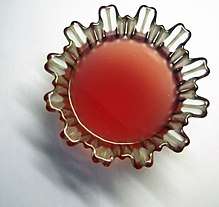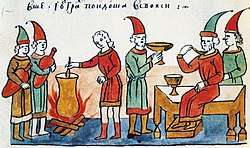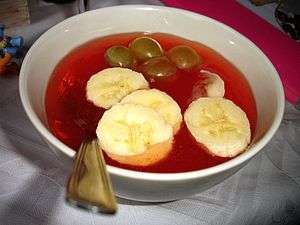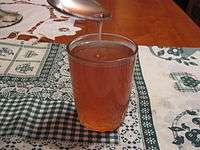Kissel
Kissel or kisel (Estonian: kissell, Finnish: kiisseli, Latgalian: keiseļs, Latvian: ķīselis, Lithuanian: kisielius, Polish: kisiel, Russian: кисель, kisél’, Ukrainian: кисiль, kysil’, Belarusian: кісель, kisél’) is a viscous fruit dish, popular as a dessert and as a drink.[1][2] It consists of the sweetened juice of berries, like mors, but it is thickened with cornstarch, potato starch or arrowroot; sometimes red wine or fresh or dried fruits are added.[2] It is similar to the Danish rødgrød and German Rote Grütze.[1] Swedish blåbärssoppa is a similarly prepared bilberry dessert.
 Estonian red currant kissel | |
| Alternative names | Kisel |
|---|---|
| Type | Fruit jelly |
| Course | Dessert |
| Main ingredients | Sweetened juice, arrowroot, cornstarch or potato starch |
Kissel can be served either hot or cold, also together with sweetened quark or semolina pudding. Kissel can also be served on pancakes or with ice cream. If the kissel is made using less thickening starch, it can be drunk — this is common in Poland, Russia and Ukraine.
Etymology and history

Its name is derived from a Slavic word meaning "sour" (cf. Russian кислый kisly), after a similar old Slavic dish — a leavened flour porridge (or weak sourdough) which was made from grain — most commonly oats, but any grain, and even legumes like peas or lentils could be used, though bean kissels usually weren't leavened — and lacked the sweetness of the modern variants. Kissel is first mentioned in the old East Slavic Primary Chronicle where there is a story of how it saved the 10th-century Rus' city of Belgorod Kievsky, besieged by nomadic Pechenegs in 997. When the food in the city became scarce and a hunger started, the inhabitants of the city followed an advice of an old man, who told them to make kissel from the remnants of grain, and a sweet drink from the last mead they could find. Then they filled a wooden container with the kissel, and another one with the mead drink, put those containers into the holes in the ground and made up two fake wells over them. When the Pechenegian ambassadors came into the town, they saw how the inhabitants took the food from those "wells", and the Pechenegs even were allowed to taste the kissel and mead beverage. Impressed by that show and degustation, Pechenegs decided to lift the siege and to go away, having concluded that the Ruthenians were mysteriously fed from the earth itself.[3]
Preparation
Nowadays most Polish households prepare kissel from instant mixes instead of the traditional way. The most popular flavours are strawberry, gooseberry, and raspberry. In Russia, the most popular flavours are cranberry, cherry, and redcurrant. Cranberry kissel (Lithuanian: spanguolių kisielius) is a traditional meal on Kūčios (Christmas Eve supper) in Lithuania. In Finland, kissel is often made of bilberries (since those can often be found growing wild in the forests and are thus both easy to gather and free) as well as from prunes, apricots, strawberries, etc. The thickness can vary depending on how much potato flour is used: thin bilberry soup is most easily consumed by drinking while the thickest version is almost like jelly and is eaten with a spoon. Rhubarb can also be used, but it is often combined with strawberries to make it less tart. Prune kiisseli (luumukiisseli) is traditionally eaten with rice pudding on Christmas. Milk kiisseli (maitokiisseli) is another variant, made from milk and flavoured with sugar and vanillin (or vanilla).
Cultural references
In Russian fairy tales, the land of marvels (similar to Cockaigne) is described as the land of "milk rivers and kissel banks". This expression became an idiom in Russian for prosperous life or "paradise on earth".[4]
Another phrase common in Russia and Poland, "the seventh water after kissel", is used to describe a distant relative.[4]
See also
- Almond jelly
- Compote
- Kompot
- List of desserts
- List of fruit dishes
- Tong Sui
References
- The Oxford Companion to Food (2014, ISBN 019104072X), page 446
- Encyclopedia of Contemporary Russian Culture (2013, ISBN 1136787852), page 73
- The Russian Primary Chronicle, Laurentian Text. Translated and edited by Samuel Hazzard Cross and Olgerd P. Sherbowitz-Wetzor. Cambridge, MA: The Mediaeval Academy of America, 1953, p.122. Kissel is translated as "porridge" in this edition.
- Matt Trezza. Kissel. Russiapedia by RT.com


.jpg)